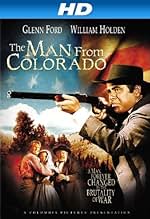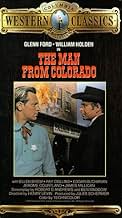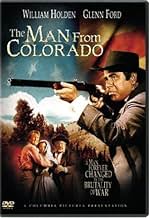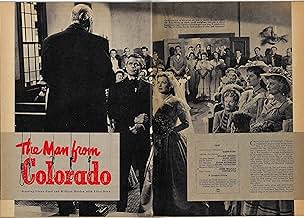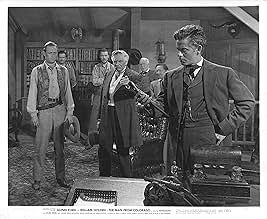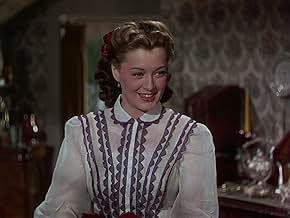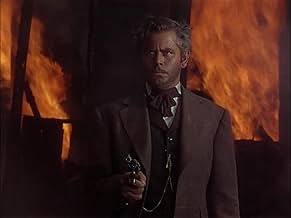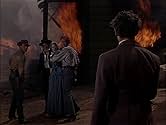IMDb RATING
6.6/10
2.1K
YOUR RATING
At the end of the Civil War, two friends return home to Colorado and one of them has changed and is violent and erratic.At the end of the Civil War, two friends return home to Colorado and one of them has changed and is violent and erratic.At the end of the Civil War, two friends return home to Colorado and one of them has changed and is violent and erratic.
- Director
- Writers
- Stars
- Awards
- 1 nomination total
William 'Bill' Phillips
- York
- (as Wm. 'Bill' Phillips)
Stanley Andrews
- Roger MacDonald
- (uncredited)
Emile Avery
- Townsman
- (uncredited)
Walter Bacon
- Townsman
- (uncredited)
Walter Baldwin
- Tom Barton
- (uncredited)
Symona Boniface
- Matron
- (uncredited)
Chet Brandenburg
- Party Guest
- (uncredited)
James Bush
- Cpl. Dixon
- (uncredited)
Nora Bush
- Townswoman
- (uncredited)
Boyd Cabeen
- Townsman
- (uncredited)
- Director
- Writers
- All cast & crew
- Production, box office & more at IMDbPro
Featured reviews
"The Man From Colorado", filmed in 1948, portrays two men and how the trauma of the Civil War affected them, and those about them. Glenn Ford delivers a truly mesmerizing performance as a Civil War commander who is slowly being gripped by madness due to the violence of the War, while William Holden plays the part of a veteran of the same war, is able to cope with the aftermath, and yet, is unable to prevent his friend from sinking into degenerate madness.
After the war has ended, both men return to the same hometown to resume their lives. Ford is appointed as a federal judge of the territory, and he, in turn, names Holden as federal marshal. Ultimately, Ford's character sinks deeper into violence and glaring errors in carrying out justice, and Holden has to try and stop his former friend.
Don't let the age of the film deceive you, this movie does pack a message that can be applied today. An 8/10 viewing mark
After the war has ended, both men return to the same hometown to resume their lives. Ford is appointed as a federal judge of the territory, and he, in turn, names Holden as federal marshal. Ultimately, Ford's character sinks deeper into violence and glaring errors in carrying out justice, and Holden has to try and stop his former friend.
Don't let the age of the film deceive you, this movie does pack a message that can be applied today. An 8/10 viewing mark
Glenn Ford was as good as anyone playing an intense psychotic, which he does here in this above-average western. Ford, playing "Col.Owen Devereaux," gets elected to the position of "judge" right after his distinguished career in the Civil War. Unfortunately, he has mental problems and this position carries too much weight for an unstable sort such as him to be carrying. His best buddy, "Capt. Del Stewart" (William Holden) sees his friend as he is and tries to reason with him and help him out but winds up being alienated, too, by the paranoid judge whose problems escalate as the story goes on.
There's not a tremendous amount of action in here, but it still moves pretty fast and looks really nice on DVD. This is one of the few color films of the 1940s.
Ellen Drew, Ray Collins and Ed Buchnan provide good supporting help in the story. If you like some of the Anthony Mann-James Stewart westerns of the late '40s/early '50s, you should like this one, too.
There's not a tremendous amount of action in here, but it still moves pretty fast and looks really nice on DVD. This is one of the few color films of the 1940s.
Ellen Drew, Ray Collins and Ed Buchnan provide good supporting help in the story. If you like some of the Anthony Mann-James Stewart westerns of the late '40s/early '50s, you should like this one, too.
"The Man From Colorado" opens in the closing days of the American Civil War. Two life long friends, Col. Owen Deveraux (Glenn Ford) and Capt. Del Stewart (William Holden) along with their troop corner a group of tired, poorly armed Confederate soldiers. They raise a white flag of surrender but Deveraux refuses to acknowledge it (unknown to the others) and orders his troops to open fire. The Confederates are all killed except for one officer.
Stewart senses that his friend is becoming psychotic but attributes it to the pressures of war. Later they return to their home town and are given a heroes welcome. The surviving Confederate officer confronts Deveraux who shoots him down with a wild look in his eyes. Meanwhile, big time mine boss Ed Carter (Ray Collins) and the Governor's representative (Stanley Andrews) offer Deveraux the position of Federal Judge. He accepts and appoints Stewart as Federal Marshal.
Most of Deveraux's troops had gold mining claims prior to going off to war. During their three year absence Carter has through a legal loophole, taken over their claims. Judge Deveraux is forced to side with Carter. This causes some of the men led by Jericho Howard (James Millican) to take to the hills and rob Carter's mining company, stealing the gold they believe to be rightfully theirs.
Jericho's kid brother Johnny (Jerome Courtland) is found with a bag of gold following a robbery during which a man was killed. Deveraux under pressure to produce the guilty parties, orders him jailed. Stewart believes in the boy's innocence and sets out to find Jericho in order to prove it. During Stewart's absence Deveraux holds a speedy trial and hangs Johnny. When Del returns he is appalled and turns in his badge and joins Jericho and his gang. This leads to further robberies until the inevitable confrontation between the two men where.............
Glenn Ford playing against type, gives one of the best performances of his career as the psychotic Deveraux. His facial expressions of increasing madness are terrifying. Holden does his best in effectively what is a supporting role, as the good friend. Ellen Drew appears as the woman both men love but who marries Deveraux only to experience first hand, his increasing madness.
Also in the cast are Edgar Buchanan as Doc Merriam, Jim Bannon as Carter's henchman Nagel and western regulars Ian MacDonald, Myron Healey, Denver Pyle and Ray Teal in other roles.
Worth a look just to catch Ford's performance.
Stewart senses that his friend is becoming psychotic but attributes it to the pressures of war. Later they return to their home town and are given a heroes welcome. The surviving Confederate officer confronts Deveraux who shoots him down with a wild look in his eyes. Meanwhile, big time mine boss Ed Carter (Ray Collins) and the Governor's representative (Stanley Andrews) offer Deveraux the position of Federal Judge. He accepts and appoints Stewart as Federal Marshal.
Most of Deveraux's troops had gold mining claims prior to going off to war. During their three year absence Carter has through a legal loophole, taken over their claims. Judge Deveraux is forced to side with Carter. This causes some of the men led by Jericho Howard (James Millican) to take to the hills and rob Carter's mining company, stealing the gold they believe to be rightfully theirs.
Jericho's kid brother Johnny (Jerome Courtland) is found with a bag of gold following a robbery during which a man was killed. Deveraux under pressure to produce the guilty parties, orders him jailed. Stewart believes in the boy's innocence and sets out to find Jericho in order to prove it. During Stewart's absence Deveraux holds a speedy trial and hangs Johnny. When Del returns he is appalled and turns in his badge and joins Jericho and his gang. This leads to further robberies until the inevitable confrontation between the two men where.............
Glenn Ford playing against type, gives one of the best performances of his career as the psychotic Deveraux. His facial expressions of increasing madness are terrifying. Holden does his best in effectively what is a supporting role, as the good friend. Ellen Drew appears as the woman both men love but who marries Deveraux only to experience first hand, his increasing madness.
Also in the cast are Edgar Buchanan as Doc Merriam, Jim Bannon as Carter's henchman Nagel and western regulars Ian MacDonald, Myron Healey, Denver Pyle and Ray Teal in other roles.
Worth a look just to catch Ford's performance.
Back in the day William Holden and Glenn Ford both had a unique contractual arrangement with Columbia Pictures. When unknown Bill Holden was up for the lead in Golden Boy, Harry Cohn cast him in return for Paramount selling 50% of his services to Columbia. Holden served two studio masters at the time he was making The Man from Colorado and would for another decade.
Glenn Ford was Columbia's bread and butter leading man at the time and right after The Man From Colorado, Cohn sold half of Ford's contract to MGM and Ford also had two studio masters.
What it meant for these two was that all projects had to be cleared through both studios and that Holden and Ford if they did an outside loan out would also have to be cleared from both. Not that their respective studios didn't keep both these guys very busy.
Holden and Ford had done a well received western, Texas, for Columbia back in 1941. Texas was a rather lighthearted film about two cowboys turning to different sides of the law in post Civil War Texas, though it did feature the death of one of them.
The Man from Colorado is also a story about the activities of Union Army war veterans. But The Man from Colorado doesn't have any light moments whatsoever. It's pretty grim tale about one of them developing a real taste for sadism and killing as a result of the war.
Ford's the sadist here, it's one of the few villain parts he ever did and it works I think because he is so against type. He did very few parts like this, Lust for Gold is another, but his public wouldn't accept him in these roles.
Some of the town businessmen led by Ray Collins just look at the war record and decide Ford would make one fine federal judge. A real law and order type. They get a lot more than they bargain for.
In Texas Holden had the showier role of the young cowboy who take the outlaw route. Here however he's the best friend who stands by his former commanding officer even though he both sees the man has issues and Holden loses Ellen Drew to Ford. Holden takes the outlaw path after giving up his marshal's job when Ford starts running roughshod over due process.
The other really standout performance in this film is that of James Milliken who plays one of Ford's former soldiers who turns outlaw and in fact humiliates him in one of the few funny moments in The Man From Colorado. Ford conceives a burning hate for him that results in tragedy all around.
Ford and Holden were considering another joint project in 1981 when Holden died. I would like to have seen that one come to pass.
Try to see The Man From Colorado back to back with Texas.
Glenn Ford was Columbia's bread and butter leading man at the time and right after The Man From Colorado, Cohn sold half of Ford's contract to MGM and Ford also had two studio masters.
What it meant for these two was that all projects had to be cleared through both studios and that Holden and Ford if they did an outside loan out would also have to be cleared from both. Not that their respective studios didn't keep both these guys very busy.
Holden and Ford had done a well received western, Texas, for Columbia back in 1941. Texas was a rather lighthearted film about two cowboys turning to different sides of the law in post Civil War Texas, though it did feature the death of one of them.
The Man from Colorado is also a story about the activities of Union Army war veterans. But The Man from Colorado doesn't have any light moments whatsoever. It's pretty grim tale about one of them developing a real taste for sadism and killing as a result of the war.
Ford's the sadist here, it's one of the few villain parts he ever did and it works I think because he is so against type. He did very few parts like this, Lust for Gold is another, but his public wouldn't accept him in these roles.
Some of the town businessmen led by Ray Collins just look at the war record and decide Ford would make one fine federal judge. A real law and order type. They get a lot more than they bargain for.
In Texas Holden had the showier role of the young cowboy who take the outlaw route. Here however he's the best friend who stands by his former commanding officer even though he both sees the man has issues and Holden loses Ellen Drew to Ford. Holden takes the outlaw path after giving up his marshal's job when Ford starts running roughshod over due process.
The other really standout performance in this film is that of James Milliken who plays one of Ford's former soldiers who turns outlaw and in fact humiliates him in one of the few funny moments in The Man From Colorado. Ford conceives a burning hate for him that results in tragedy all around.
Ford and Holden were considering another joint project in 1981 when Holden died. I would like to have seen that one come to pass.
Try to see The Man From Colorado back to back with Texas.
The end of the Civil War is nigh and one last pocket of Confederate resistance is holed up at Jacob's Gorge. Knowing their time is up they hoist the white flag in surrender. Union Colonel Owen Devereaux sees the white flag but orders the attack anyway. Returning home with his friend and colleague, Capt. Del Stewart, Devereaux grows ever more erratic by the day, his friends, his loves and all who cross him, are sure to pay if they can't rein in his madness.
Starring Glenn Ford as Devereaux and William Holden as Stewart, directed by Henry Levin, The Man from Colorado, from a story by Borden Chase, is an intriguing psychological Western. The story follows the theme of a man ravaged by war and his inability to let go of the anger and mistrust gnawing away at him. Perfectly essayed by Ford as Devereaux (great to see him donning some bad guy boots), the film is rather grim in context. Light on action (no bad thing here at all) it's with the dialogue driven characters that Levin's film really triumphs. Having both become lawmen, it would have been easy for all to just play out a standard oater as the two friends are driven apart by not only their different levels of sanity (Holden's Stewart is an excellent counter point to Ford's blood thirst), but also the love of a good woman (Ellen Drew's petite Caroline Emmet). However, Chase's story has other elements to keep it from ever being formulaic. There's a deep political thread involving power and those entrusted with it, while the treatment of returning soldiers is firmly given prominence. Here the "boys" return after 3 years of being knee deep in blood and bone, to find that their claims are no longer valid. Snaffled by a greedy corporate type, thus as the "boys" look to the law for help?...
As a story it has substance of depth, how nice to also find that there are smart technical aspects to harness the screenplay. The Simi Valley location work is fabulous, most appealing. William E. Snyder's cinematography work is top draw, arguably his best work in the Western genre. It's fair to say that even a "c" grade Western can look nice if given a good transfer, but when the Technicolor print is good, you can tell the difference big time, and this piece is first rate. The dusty orange and browns of the scenery fabulously envelopes the blue uniforms, while the green and gold glow lamps are vivid and shine bright as if extra characters in the piece. Even Ford's greying temples have a classy sheen to them, almost belying his characters anger. All Western fans simply must hone into High Definition TV because although we always knew how fabulous these pictures looked, now it's another dimension of rewards unbound.
As the finale comes in a blaze of fire (welcome to hell!), The Man from Colorado has achieved the two essential Western requirements if it wants to be taken seriously - one is that it looks gorgeous, the other is that it has strong thematics to drive it forward - this has both. Hooray! 8/10
Starring Glenn Ford as Devereaux and William Holden as Stewart, directed by Henry Levin, The Man from Colorado, from a story by Borden Chase, is an intriguing psychological Western. The story follows the theme of a man ravaged by war and his inability to let go of the anger and mistrust gnawing away at him. Perfectly essayed by Ford as Devereaux (great to see him donning some bad guy boots), the film is rather grim in context. Light on action (no bad thing here at all) it's with the dialogue driven characters that Levin's film really triumphs. Having both become lawmen, it would have been easy for all to just play out a standard oater as the two friends are driven apart by not only their different levels of sanity (Holden's Stewart is an excellent counter point to Ford's blood thirst), but also the love of a good woman (Ellen Drew's petite Caroline Emmet). However, Chase's story has other elements to keep it from ever being formulaic. There's a deep political thread involving power and those entrusted with it, while the treatment of returning soldiers is firmly given prominence. Here the "boys" return after 3 years of being knee deep in blood and bone, to find that their claims are no longer valid. Snaffled by a greedy corporate type, thus as the "boys" look to the law for help?...
As a story it has substance of depth, how nice to also find that there are smart technical aspects to harness the screenplay. The Simi Valley location work is fabulous, most appealing. William E. Snyder's cinematography work is top draw, arguably his best work in the Western genre. It's fair to say that even a "c" grade Western can look nice if given a good transfer, but when the Technicolor print is good, you can tell the difference big time, and this piece is first rate. The dusty orange and browns of the scenery fabulously envelopes the blue uniforms, while the green and gold glow lamps are vivid and shine bright as if extra characters in the piece. Even Ford's greying temples have a classy sheen to them, almost belying his characters anger. All Western fans simply must hone into High Definition TV because although we always knew how fabulous these pictures looked, now it's another dimension of rewards unbound.
As the finale comes in a blaze of fire (welcome to hell!), The Man from Colorado has achieved the two essential Western requirements if it wants to be taken seriously - one is that it looks gorgeous, the other is that it has strong thematics to drive it forward - this has both. Hooray! 8/10
Did you know
- TriviaColumbia Pictures spent quite a bit on The Man in Colorado. At one point, the crew dynamited the side of a 1500-foot mountain in California's San Fernando Valley in order to create a deep gorge as called for by the script. And the western town they constructed was one of the largest location sets ever built by Columbia up to that time. During filming of a massive fire scene at the end, however, the set caught fire uncontrollably, and Holden and Ford tried to actually fight the fire until firemen could arrive. "Dad came away coated in black soot, with burns to his arms and hands," Ford's son Peter later wrote.
- GoofsMany of the men are wearing trousers with belt loops and belts. Belt loops were not added to men's trousers until the 20th century.
- Quotes
Owen Devereaux: [voiceover as he writes in his diary] I killed a hundred men today. I didn't want to. I couldn't help myself. What's wrong with me? I'm afraid... afraid I'm going crazy.
- Crazy creditsOpening credits are listed in the pages of a book being turned by a hand.
- ConnectionsFeatured in Brave Warrior (1952)
- SoundtracksWhen Johnny Comes Marching Home
(uncredited)
Written by Louis Lambert (pseudonym for Patrick Sarsfield Gilmore)
Played at the homecoming
- How long is The Man from Colorado?Powered by Alexa
Details
Box office
- Budget
- $1,000,000 (estimated)
- Runtime
- 1h 40m(100 min)
- Color
- Aspect ratio
- 1.37 : 1
Contribute to this page
Suggest an edit or add missing content


